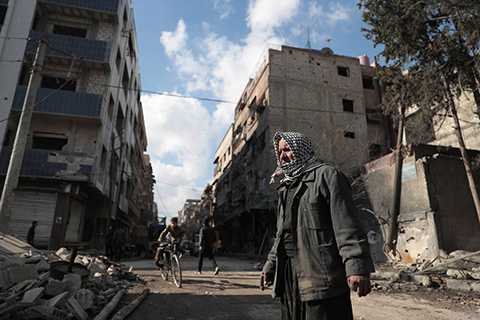 TOPSHOT - Syrian Abu Khaled looks at the rubble of his destroyed house in the rebel-held town of Douma, on the eastern outskirts of Damascus, on December 30, 2016, on the first day of a nationwide truce. Clashes erupted between Syrian government forces and opposition fighters in an area outside Damascus, despite a nationwide truce that began at midnight, a monitor said. / AFP / Abd Doumany
TOPSHOT - Syrian Abu Khaled looks at the rubble of his destroyed house in the rebel-held town of Douma, on the eastern outskirts of Damascus, on December 30, 2016, on the first day of a nationwide truce. Clashes erupted between Syrian government forces and opposition fighters in an area outside Damascus, despite a nationwide truce that began at midnight, a monitor said. / AFP / Abd DoumanyBEIRUT: Clashes, shelling and air raids in western Syria marred a Russian- and Turkish-backed ceasefire that aims to end nearly six years of war and lead to peace talks between rebels and a government emboldened by recent battlefield success.
Russian President Vladimir Putin, a key ally of Syrian President Bashar al-Assad, announced the ceasefire on Thursday after forging the agreement with Turkey, a longtime backer of the opposition.
The truce went into force at midnight but monitors and rebels reported almost immediate clashes, and violence appeared to escalate later yesterday as warplanes bombed areas in the country's northwest, they said.
The ceasefire is meant as a first step towards fresh peace talks, after several failed international efforts this year to halt the conflict, which began as a peaceful uprising and descended into civil war in 2011. It has drawn in the military involvement of world and regional powers, including Moscow and Ankara.
The agreement brokered by Russia and Turkey, which said they will guarantee the truce, is the first of three ceasefire deals this year not to involve the United States or United Nations.
Moscow is keen to push ahead with peace talks, hosted by its ally Kazakhstan, to end Syria's conflict which has resulted in more than 300,000 deaths and displaced more than 11 million people, half its pre-war population.
Foreign Minister Sergei Lavrov and his Kazakh counterpart Kairat Abdrakhmanov discussed plans for the talks yesterday, the Russian ministry said.
Previous collapses
But the first challenge will be maintaining the truce, which looked increasingly shaky yesterday. Syrian warplanes carried out at least 16 raids against rebels in the northern Hama countryside, the Syrian Observatory for Human Rights said. Clashes between insurgents and government forces and their allies took place overnight along the provincial boundary between Idlib and Hama, the Observatory and a rebel official said.
Government forces and their allies meanwhile clashed with rebels near Damascus, and helicopter gunships carried out air raids in the area, the British-based Observatory reported. An official from the Nour al-Din al-Zinki rebel group said government forces had also tried to advance in southern Aleppo province.
There was no immediate comment from the Syrian military on clashes. A number of rebel groups have signed the new agreement, Russia's Defence Ministry said on Thursday. Several rebel officials acknowledged the deal, and a spokesman for the Free Syrian Army (FSA), a loose alliance of insurgent groups, said it would abide by the truce.
The previous two Syria ceasefires, brokered by Cold War foes Washington and Moscow, took effect in February and September but both collapsed within weeks as warring sides accused each other of truce violations and fighting intensified.
Putin said the parties were prepared to start peace talks intended to take place in Astana. Syrian state media said late on Thursday those talks would take place "soon". The Syrian government will be negotiating from a strong position after its army and their allies, including Shi'ite militias supported by Iran, along with Russian air power, routed rebels in their last major urban stronghold of Aleppo this month. - Reuters










